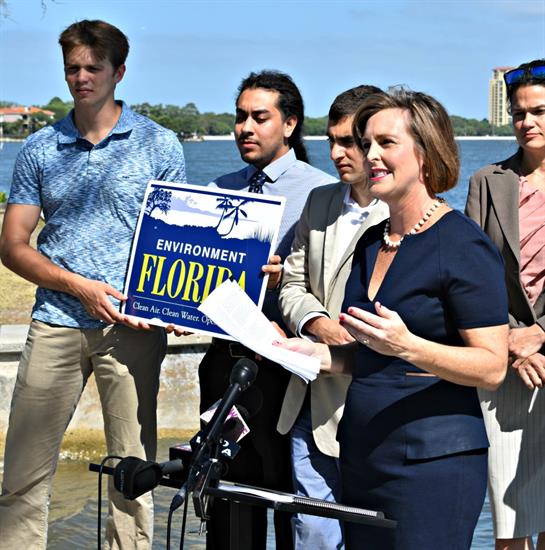U.S. Rep. Kathy Castor (FL14) reintroduced her bipartisan Florida Coastal Protection Act today, which would make permanent the moratorium on oil drilling that exists now but is slated to expire in 2022. U.S. Rep. Castor is joined by several of her Florida colleagues in standing up for Florida’s natural resources and economy and in taking on powerful oil and gas companies.
“Here in Florida, we are keenly aware of the devastating impacts of oil and gas drilling off our shores,” U.S. Rep. Castor said. “Our state’s vital natural resources – and our state’s economy – cannot risk the devastation brought by blowouts, nor can it afford the high costs of carbon pollution. We have an obligation to act now to protect our beautiful Florida coastline, our economy and our future – and I am proud to have my colleagues from Florida, including U.S. Rep. Francis Rooney (FL19), join me.”
The moratorium currently in place protects waters up to 235 miles off the west coast of Florida from oil drilling and will expire in June 2022 unless made permanent by U.S. Rep. Castor’s bill. Florida has experienced the devastating impacts of offshore oil drilling on marine ecosystems, ocean health, coastlines and wildlife, especially in 2010 during the Deepwater Horizon oil spill disaster and several other spills currently happening throughout the middle and western Gulf, like the Taylor spill.
This past November, a huge majority of Floridians made it clear that the risk of oil drilling is too much when they voted overwhelmingly in favor of banning drilling in Florida’s state waters. State waters begin at the state’s shores and extend to three miles into the Atlantic Ocean and nine miles into the Gulf. U.S. Rep. Castor’s bipartisan Florida Coastal Protection Act extends the recently approved state moratorium to federal waters.
U.S. Rep. Rooney, who joined U.S. Rep. Castor in introducing her bipartisan Florida Coastal Protection Act, said, “The people of Florida are clearly opposed to offshore drilling. The November 2018 ballot contained a ban on offshore drilling, Amendment 9, which won with over 68% in favor. This widespread support is a clear indication that voters are overwhelmingly in support of Florida coastal protection. As Floridians, we are well aware that our livelihood depends on a pristine environment.”
U.S. Rep. Castor is also joined by U.S. Reps. Crist (FL13) and Buchanan (FL16).
“Florida voters spoke clearly in November: no drilling off our coasts,” said U.S. Rep. Crist. “Our job is to be their voice in Washington, sending that same message loud and clear with this bill to block harmful drilling and exploration off of Florida. We cannot afford another disaster devastating our waters, health, and economy.”
“Allowing drilling off of Florida’s pristine coasts would be a colossal mistake,” said U.S. Rep. Buchanan. “Red tide has already plagued the Sunshine State – it would be imprudent to invite the potential for another catastrophic oil spill that would devastate Florida’s economy and environment. As co-chair of the Florida congressional delegation, I will continue working with colleagues in both parties to protect the state’s beautiful coasts and waters.”
“It is vital that we act now on the changing climate and the extreme weather events. By prohibiting oil drilling off Florida’s coast, we will also prevent dangerous carbon pollution,” U.S. Rep. Castor continued. “Here in Tampa Bay and throughout Florida, we see rising tidal levels and temperatures, sunny day flooding, disappearing corals and longer mosquito seasons. These are the real everyday impacts of climate change that my neighbors are experiencing, and which carbon pollution engenders. We must not exacerbate the climate crisis, but instead take actions like extending the moratorium to solve it. The Tampa Bay region’s 4 million residents live in a region that is ranked as the country’s most vulnerable metropolitan area to storm surge with $175 billion in potential losses. Clearly its coastal infrastructure is already vulnerable to the impacts of climate change and extreme weather events.
“The climate change, environmental and economic reasons to prohibit drilling off Florida’s coasts are perhaps the most pressing. However, of vital importance also is ending the threat this drilling presents to our national security: the Gulf is a vital training area for our military,” said U.S. Rep. Castor. “The Department of Defense has stated clearly that the area continues to be a strategic national asset critical to our weapon systems and the readiness of our service members.”
U.S. Rep. Castor has been an outspoken opponent of oil drilling off of Florida’s coast throughout her tenure in Congress. In 2008, she filed her first version of the Florida Coastal Protection Act to make the ban on oil drilling and leasing activities permanent. She fought to hold BP accountable following the Deepwater Horizon oil spill disaster, including grilling BP CEO Tony Hayward during an Energy and Commerce Committee Oversight and Investigation hearing. She secured $10 million from BP to support Florida college and university marine research, and led the Gulf Coast states to a major victory when the RESTORE Act was passed by Congress. She introduced the Gulf of Mexico Economic and Environmental Restoration Act to fund long-term economic recovery, environmental restoration and research with the fines and penalties to be paid by BP for its pollution under the Clean Water Act. She was recently named by Speaker Pelosi to lead the Select Committee on the Climate Crisis, where she plans to act with urgency to reduce carbon pollution, help unleash American ingenuity and create clean energy jobs to power our future.
“Plain and simple, we must protect our state’s natural resources and our economy linked to our environment and treat climate change like the crisis that it is. We also have a moral obligation to be better stewards for our children and future generations. A moratorium on oil drilling off the coast of Florida through my bipartisan Florida Coastal Protection Act is integral to accomplishing these inextricable goals,” U.S. Rep. Castor said.
###


